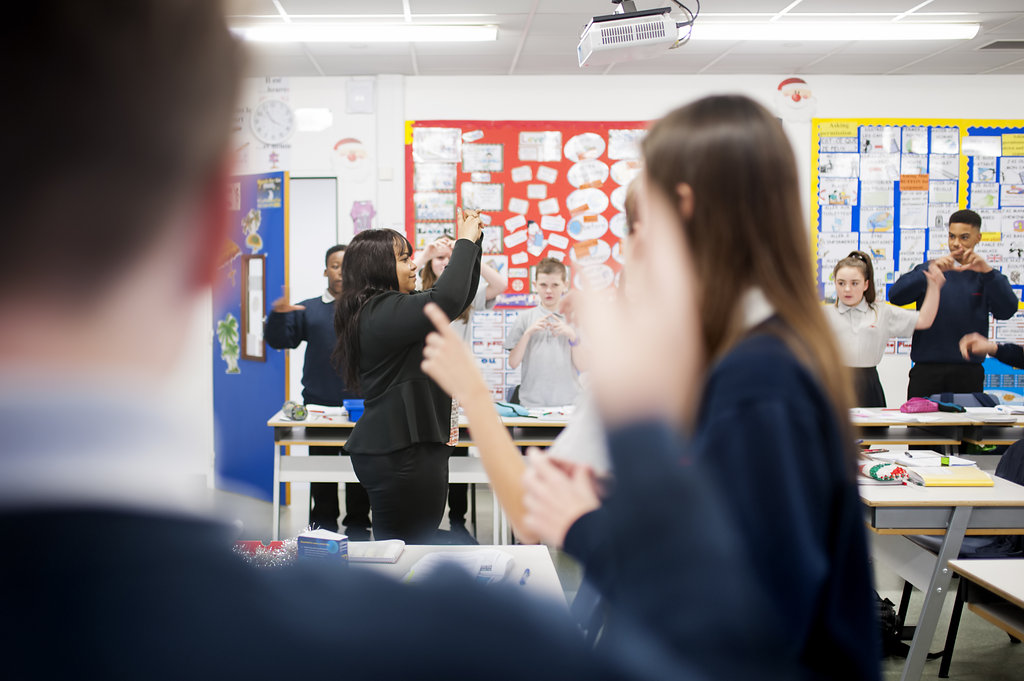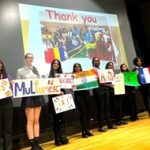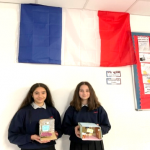We are a well-resourced department of 3 full-time staff and 1 part-time staff, based in our own suite of languages rooms. We teach French across the age range and begin Spanish in year 10 for students who want to pick it for their GCSE.
We aim to enable students to understand and use the foreign language they are learning to be able to use it in real life contexts both when visiting another country, or when meeting French or Spanish speaking people in our own country.
Curriculum intent
Through the MFL curriculum, we want to:
- Foster a love of learning another language which provides the opportunity to develop the skills of listening, speaking, reading, and writing.
- Develop the pupils’ oracy, fluency, spontaneity, and communicative skills by enabling the students to express their ideas and thoughts with confidence in another language and to understand and respond to native speakers both in speech and in writing.
- Provide opportunities for the students to communicate for practical purposes, learn new ways of thinking and read great literature in the original language (They do a lot of this at GCSE level with the literary component in the section B-reading).
- Enable the students to speak with increasing confidence, fluency, and spontaneity, finding ways of communicating what they want to say, including through discussion and asking questions, and continually improving the accuracy of their pronunciation and intonation in class.
- Help the students to write at varying length, for different purposes using the variety of grammatical structures and complex structures that they have learnt
- Foster the children’s curiosity and deepen their understanding of the world around them.
- Develop the students’ cultural capital and awareness of France and French speaking countries and they diverse way of life.
- Provide an opening to other cultures and encourage pupils to appreciate and celebrate difference.
- Provide the foundation for learning other languages.
- Give students the opportunity to study and work in other countries and have a real advantage in an international job market.
- Develop the pupils’ critical thinking when they analyse grammatical structures.
We do this across for different skills: Listening, speaking. The skill areas are listening, speaking, reading and writing:
Listening
Students learn how to identify sound patterns and characteristics of the spoken language as well as how to identify the gist and detail of an item of speech and progressively longer recordings.
Speaking
Students are encouraged to contribute increasingly to spontaneous talk in the classroom in the foreign language. They learn how to extend and add interest, intonation and expression to their speech as they advance. The use of idiomatic expressions used in the French-speaking country is also encouraged.
Reading
Throughout Key Stages students learn techniques on how to approach a written text and gain understanding from it. Students meet a range of extended reading materials in class and have access to non-fiction books to improve their vocabulary and comprehension skills. In a year 7, we have introduced a reading scheme to enable students to recognise sounds and read with more confidence.
Writing
As students are progressing, they learn how to move from simple to more complex structures of language which can be manipulated to support students’ development in this skill area towards students planning and writing extended paragraphs in the foreign language. Students in KS3 must write pieces of extended writing, after each new topic learnt. In April, students are then asked to compile all their redrafted paragraphs in order to have a longer writing that will embed all the learning done in the year.
Learning a language also offers lots of transferable skills such as communication skills, adaptability/resilience /resourcefulness, independent learner, cultural development, and global awareness.
The curriculum provides breadth and depth as the student will revisit topics studied at Key Stage 3 and will go into each of them much more deeply at KS4.
As the course goes on, the students develop a greater understanding of the French language as well as different aspects of French culture through the range of themes and topics studied.
The topics for KS3 and KS4 have been chosen based on the GCSE specification and we have strategically planned out when to teach them and how long to dedicate to each of them, allowing plenty of time for revision.
At KS3 with follow the National Curriculum and base most of our teaching on the EXPO 1-4 books. We also strive to incorporate authentic texts and resources from the internet to give pupils first-hand understanding of the French culture in France but also in other French speaking countries.
Cultural knowledge and contact
This is an intrinsic feature of every stage of language learning and enables students to learn about where in the world the foreign language is spoken, the cultures and people that it represents, what we can learn about those cultures and how they are different from our own.
Homework is identified in each unit of work. Learning homework will be set every week for all KS3 students (year 7, 8 and 9). We will be expecting students to learn their keywords correctly as they will be assessed regularly with low-stake testing.
A range of worksheets will also be given to pupils to reinforce the learning done in class. Extension tasks or challenges will also be available at students’ request to stretch pupils’ learning.
Homework
Homework is identified in each unit of work. Learning homework will be set every week for all KS3 students (year 7, 8 and 9). We will be expecting students to learn their keywords correctly as they will be assessed regularly with low-stake testing.
A range of worksheets will also be given to pupils to reinforce the learning done in class. Extension tasks or challenges will also be available at students’ request to stretch pupils’ learning.
Schemes of Work and Content
KS3 CURRICULUM LEARNING JOURNEY





